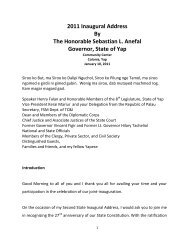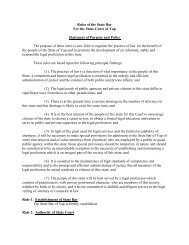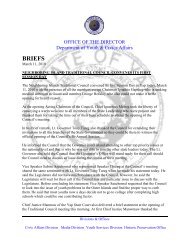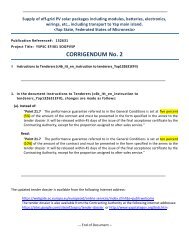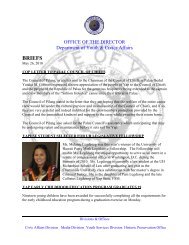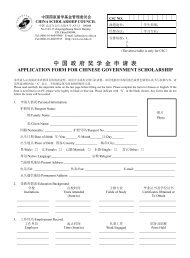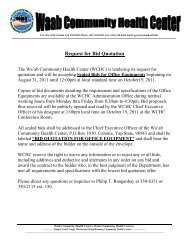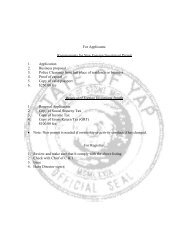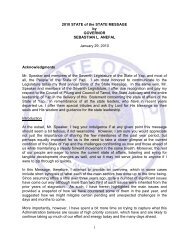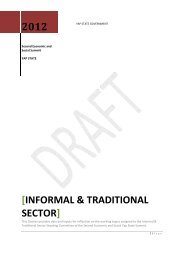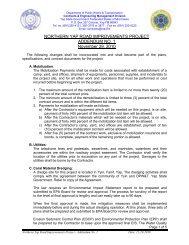RULES OF CIVIL PROCEDURE For the Trial Division of the Yap ...
RULES OF CIVIL PROCEDURE For the Trial Division of the Yap ...
RULES OF CIVIL PROCEDURE For the Trial Division of the Yap ...
Create successful ePaper yourself
Turn your PDF publications into a flip-book with our unique Google optimized e-Paper software.
deposition <strong>of</strong> <strong>the</strong> physician or medical <strong>of</strong>ficer in accordance with <strong>the</strong> provisions <strong>of</strong> any<br />
o<strong>the</strong>r rule.<br />
Rule 36. Requests for Admission.<br />
(a) Request for Admission. A party may serve upon any o<strong>the</strong>r party a written request<br />
for <strong>the</strong> admission, for purposes <strong>of</strong> <strong>the</strong> pending action only, <strong>of</strong> <strong>the</strong> truth <strong>of</strong> any matters<br />
within <strong>the</strong> scope <strong>of</strong> Rule 26(b) set forth in <strong>the</strong> request that relate to statements or opinions<br />
<strong>of</strong> fact or <strong>of</strong> <strong>the</strong> application <strong>of</strong> law to fact, including <strong>the</strong> genuineness <strong>of</strong> any documents<br />
described in <strong>the</strong> request. Copies <strong>of</strong> documents shall be served with <strong>the</strong> request unless <strong>the</strong>y<br />
have been or are o<strong>the</strong>rwise furnished or made available for inspection and copying. The<br />
request may, without leave <strong>of</strong> court, be served upon <strong>the</strong> plaintiff after commencement <strong>of</strong><br />
<strong>the</strong> action and upon any o<strong>the</strong>r party with or after service <strong>of</strong> <strong>the</strong> summons and complaint<br />
upon that party.<br />
Each matter <strong>of</strong> an admission shall be separately set forth. The matter is admitted<br />
unless, within 30 days after service <strong>of</strong> <strong>the</strong> request, or within such shorter or longer time as<br />
<strong>the</strong> court may allow, <strong>the</strong> party to whom <strong>the</strong> request is directed serves upon <strong>the</strong> party<br />
requesting <strong>the</strong> admission a written answer or objection addressed to <strong>the</strong> matter, signed by<br />
<strong>the</strong> party, his attorney or trial counselor, but, unless <strong>the</strong> court shortens <strong>the</strong> time, a<br />
defendant shall not be required to serve answers or objections before <strong>the</strong> expiration <strong>of</strong> 45<br />
days after service <strong>of</strong> <strong>the</strong> summons and complaint upon him. If objection is made, <strong>the</strong><br />
reasons <strong>the</strong>refor shall be stated. The answer shall specifically deny <strong>the</strong> matter or set forth<br />
in detail <strong>the</strong> reasons why <strong>the</strong> answering party cannot truthfully admit or deny <strong>the</strong> matter.<br />
A denial shall fairly meet <strong>the</strong> substance <strong>of</strong> <strong>the</strong> requested admission, and when good faith<br />
requires that a party qualify his answer or deny only a part <strong>of</strong> <strong>the</strong> matter <strong>of</strong> which an<br />
admission is requested, he shall specify so much <strong>of</strong> it as is true and qualify or deny <strong>the</strong><br />
remainder. An answering party may not give lack <strong>of</strong> information or knowledge as a<br />
reason for failure to admit or deny unless he states that he has made reasonable inquiry<br />
and that <strong>the</strong> information known or readily obtainable by him is insufficient to enable him<br />
to admit or deny. A party who considers that a matter <strong>of</strong> which an admission has been<br />
requested presents a genuine issue for trial may not, on that ground alone, object to <strong>the</strong><br />
request; he may, subject to <strong>the</strong> provisions <strong>of</strong> Rule 37(c), deny <strong>the</strong> matter or set forth<br />
reasons why he cannot admit or deny it.<br />
The party who has requested <strong>the</strong> admissions may move to determine <strong>the</strong> sufficiency <strong>of</strong><br />
<strong>the</strong> answers or objections. Unless <strong>the</strong> court determines that an objection is justified, it<br />
shall order that an answer be served. If <strong>the</strong> court determines that an answer does not<br />
comply with <strong>the</strong> requirements <strong>of</strong> this rule, it may order ei<strong>the</strong>r that <strong>the</strong> matter is admitted<br />
or that an amended answer be served. The court may, in lieu <strong>of</strong> <strong>the</strong>se orders, determine<br />
that final disposition <strong>of</strong> <strong>the</strong> request be made at a pre-trial conference. or at a designated<br />
time prior to trial. The provisions <strong>of</strong> Rule 37(a)(4) apply to <strong>the</strong> award <strong>of</strong> expenses<br />
incurred in relation to <strong>the</strong> motion.<br />
(b) Effect <strong>of</strong> Admission. Any matter admitted under this rule is conclusively<br />
established unless <strong>the</strong> court on motion permits withdrawal or amendment <strong>of</strong> <strong>the</strong><br />
admission. Subject to <strong>the</strong> provisions <strong>of</strong> Rule 16 governing amendment <strong>of</strong> a pre-trial



